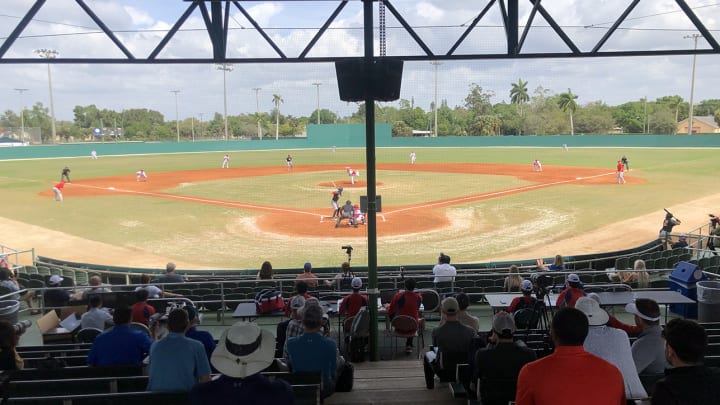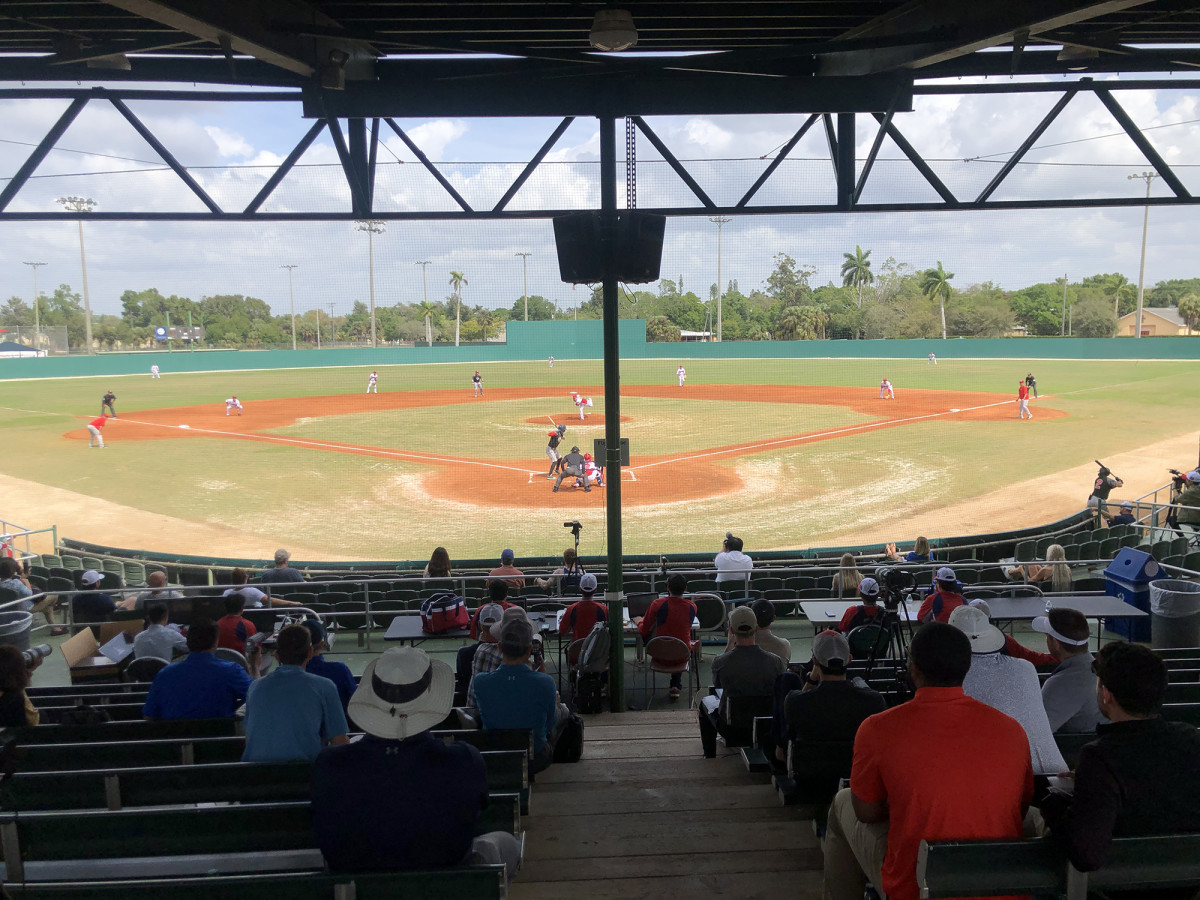Coronavirus Concern Keeping South Korea's Kia Tigers in Florida

FORT MYERS, Fla. — When the Kia Tigers got to the ballpark one day last week, a coworker put a gun to their heads.
36.5° Celsius, the non-contact digital thermometer reported. Normal. Every player on the team was within healthy range. The testing was strictly precautionary—no one seemed sick—but amid the global coronavirus pandemic, you can’t blame them for wanting to be sure.
The Tigers, based in Gwangju, South Korea, are the most successful team in Korean professional baseball history, with 11 championships. Last July, they made plans to spend spring training in Fort Myers, Fla. But now that the coronavirus has taken hold at home, they are stuck here.
It’s “a difficult situation,” said Tigers manager Matt Williams, who skippered the Washington Nationals for two years and spent the last two seasons as bench coach for the Oakland A’s.
Originally the itinerary called for the team to arrive on Jan. 30 and begin workouts at Terry Park, former spring training home of the Philadelphia Athletics, the Indians, the Pirates and the Royals. (Even the warmest parts of South Korea rarely exceed 40° Fahrenheit in March, so KBO teams hold spring training everywhere from Arizona to Australia.) The Tigers would practice for three weeks and then stage 15 games against teams composed of independent-league players. They would head home on March 6.
But coronavirus—and COVID-19, the illness it causes—has hit Korea harder than any other country but China. At least 5,000 people have been infected and 32 have died. The players are quick to point out that Korea has been thorough in testing its citizens for COVID-19, so although the number of patients seems high, the ratio of people infected to people tested is actually comparable with that of other countries.
“They’re taking a lot more precautions than the U.S. is right now,” said American outfielder Preston Tucker, who played parts of two years with the Houston Astros and is in his second season with the Tigers. “They’re testing people and making sure everyone’s safe.”
Still, the crisis shows no signs of abating. Last month, the U.S. Centers for Disease Control and Prevention assigned South Korea a Level 3 rating, the highest it offers, and recommended that Americans avoid non-essential travel there. Most of the country’s cases seem to have originated in the city of Dageu, about 100 miles northeast of the Tigers’ home of Gwangju.
On Feb. 27, the KBO cancelled each team’s 10 preseason exhibition games, which spurred a frantic series of conversations among Tigers officials. If they returned to South Korea as planned, they would languish for almost a month before the regular season was scheduled to begin March 28. So they extended their contracts with the Holiday Inn Express and with Terry Park. As of now, they plan to fly home on March 14.

In the meantime, they are trying to enjoy the trip. Most players had never been to the United States before, and most of them speak little or no English, so every outing is an adventure. They take every fourth day off, and they tend to sightsee en masse. The team bus has ferried them to local beaches and to the Miramar Outlets, where they stock up on sizes and styles that are more difficult to find at home. (The 6’5” hitting coach, former Chicago Cubs first baseman Hee-Seop Choi, in particular, struggles to outfit himself in Korean stores.) Pre- and postgame spreads are catered by nearby Asian fusion restaurant Origami; nights off generally consist of dinners at Texas Roadhouse or Longhorn Steakhouse. First basemen Min-Sang Yoo, who spent part of his childhood in Los Angeles, and Yeong-Seok Jang have gone fishing.
“Bass is huge over here,” Yoo said.
And there are advantages from a baseball perspective: Williams has pointed out to the players that the extra time in the U.S. gives them additional chances to make an impression on MLB teams. When lefthanded ace Hyeon-Jong Yang pitched on Wednesday, seven scouts looked on. From a distance, their radar guns looked a bit like thermometer guns. Despite the disruption, the players try to focus on preparing for the season.
But they are beginning to grow antsy. Although the competition—first the Fort Lauderdale Superstars, now the Baseball Scouting League—has been good, they would prefer to face teams they will see during the regular season. And the suburban lifestyle has been something of a shock to the cosmopolitan Tigers. In an ironic twist, COVID-19 has now made landfall in Florida, so they spend much of their time cooped up in the hotel, trying to avoid the disease that is keeping them from home.
They are also anxious about their families. Some, such as Yang, have young kids. (Yang’s are 3, 4 and 6.) They try to call and video chat daily. And everyone has parents. No one on the team has a family member who has reported COVID-19 symptoms yet, but they all check in frequently. They feel helpless, worrying from afar.
“I think everyone’s a little bit concerned,” said Williams.
Not least the team trainers, whose worst fear is that someone will catch COVID-19 here. An infected person might not be allowed to enter Korea, which would derail the whole carefully choreographed return plan. So they remind players daily to wash their hands. They try to monitor anyone who coughs or sneezes. Occasionally they take their temperature. The Tigers just need to make it to March 14. Then they can go home. They hope.
